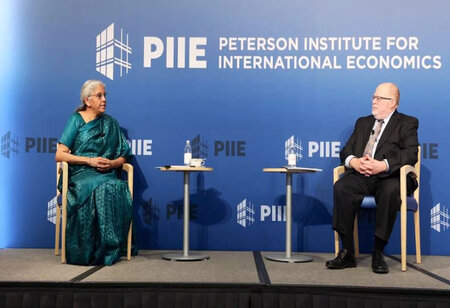India's Finance Minister Nirmala Sitharaman Advocates for Transparent Globalisation During US Visit
By Consultants Review Team
 On Monday, Union Finance Minister Nirmala Sitharaman stated that India does not aim to undo the advantages of globalization. Rather, she emphasized the need for increased transparency in the process of globalization, during her discussion with the prominent American think-tank, Peterson Institute for International Economics.
On Monday, Union Finance Minister Nirmala Sitharaman stated that India does not aim to undo the advantages of globalization. Rather, she emphasized the need for increased transparency in the process of globalization, during her discussion with the prominent American think-tank, Peterson Institute for International Economics.
India has been striving to promote growth in its manufacturing sector for a considerable period. According to Union Finance Minister Nirmala Sitharaman, India possesses the potential to manufacture many consumer goods that it does not import. However, due to price differences or competitive pricing, it may end up buying imported products that it is capable of producing domestically at a much lower cost.
Union Finance Minister Nirmala Sitharaman noted that Indians have faced challenges in producing certain everyday household items that they require, as cheaper imports are available. However, she emphasized that there is now an opportunity to produce such goods within India, as there is sufficient purchasing power within the country. Sitharaman explained that there is a significant consumer base in India for these domestically-produced goods, and it presents a clear opportunity for the country. Also, Nirmala Sitharaman observed that producing goods for the domestic market has become a more appealing prospect for many manufacturers who may not have considered producing such items before. Previously, cheaper imported goods were available, making domestic production less lucrative. However, the situation has now changed, and domestic production is becoming more attractive to these producers.
According to Union Finance Minister, the phase manufacturing programs implemented in India have identified various goods that can be produced domestically. She explained that the first stage would involve gradually incentivizing the production and sale of these goods within India, before moving on to more sophisticated products. Sitharaman emphasized that the domestic market is now available for manufacturers to produce these goods and gradually decrease their reliance on imported goods. She added that through these measures, the production of these goods domestically can be increased, leading to a reduction in imports and providing employment opportunities for people in India.
Sitharaman noted that while promoting domestic manufacturing is essential, there is also a need for value chains to come to India and produce goods for both domestic consumption and export. To encourage this, the government has launched a production-linked incentive scheme in 13 priority and sunrise sectors where India had not previously produced goods. This scheme provides incentives to manufacturers who produce goods in India and then export them to other countries.
India's goal is to increase the production of bulk manufactured goods that can meet the demand both domestically and in other countries. Union Finance Minister Nirmala Sitharaman pointed out that mobile manufacturing is an excellent example of this. The government is promoting the manufacturing of goods that are largely consumed in India, despite the existence of predatory pricing in some export markets. The government is implementing phase manufacturing and production-linked incentive schemes to encourage domestic production and reduce reliance on imports.
Sitharaman acknowledged that while India is focused on incentivizing domestic production, there may be some collateral effects that need to be managed smartly. The government needs to ensure that the raw materials and intermediaries required for domestic production are available, even if they are not produced domestically. Therefore, the decision-making process needs to be thoughtful, taking into account India's unique demands and potential impacts outside the country.
According to Sitharaman, India cannot make decisions in isolation when it comes to incentivizing its production and ensuring that its unique demands are met. She acknowledged that such decisions will have an impact, but it is necessary to assess each situation and take a call. She noted that India is not alone in re-evaluating its approach to globalization and trade, especially in light of the pandemic and changing perspectives on the topic. She emphasized that there is a global debate happening on how global trade will have to happen, and tariff is not the only way to control or preserve capacities in manufacturing. Therefore, the discussions on this topic happening around the world will also have an impact on India, leading to a dynamic position widely on globalization.
When asked about India's stance on Free Trade Agreements (FTA), Finance Minister Nirmala Sitharaman stated that India has been successful in pursuing FTAs with other countries. She added that these agreements are being signed at a faster pace nowadays and cited recent agreements with Australia, the UAE, Mauritius, and ASEAN countries in both goods and services. India also has FTAs with South Korea and Japan. The minister explained that FTAs have been the route India has taken for international trade before 2014, both bilaterally and with multilateral groups.
Sitharaman stated that India has been successful in signing Free Trade Agreements (FTA) with many countries, with recent agreements with Australia, UAE, Mauritius, ASEAN, South Korea, and Japan. She noted that India will continue to pursue this route, with negotiations currently underway with the UK, EU, and Canada. However, she did not express any commitment to plurilateral agreements.




